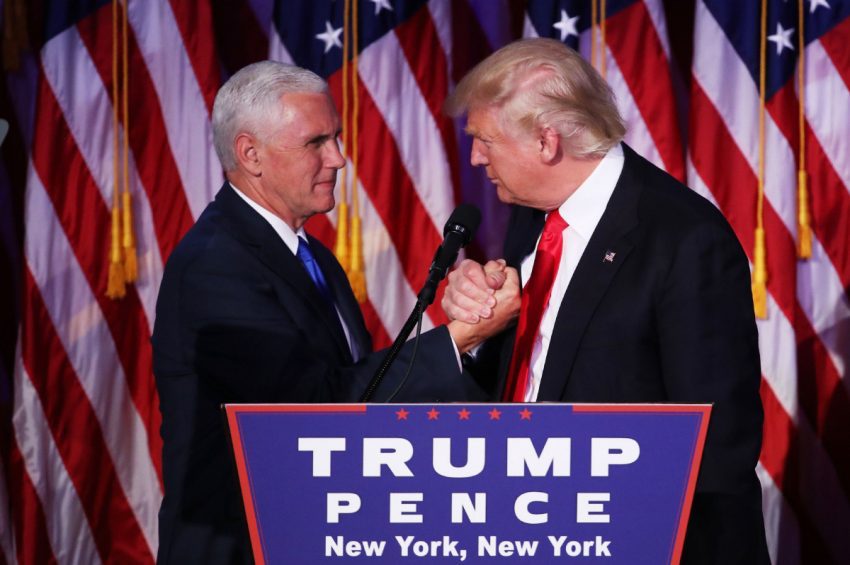We should have known that something was up. The Cavaliers captured the NBA championship, the Cubs won the World Series, the U.K. voted to leave the E.U., and Bob Dylan won the Nobel Prize in Literature. This is not an ordinary year.
After the networks declared on Wednesday morning that Donald J. Trump will become the 45th President of the United States, the words of Nobel’s latest laureate came to mind, “Something’s happening here, and you don’t know what it is, do you, Mr. Jones?”
Like most of those in the chattering classes, I was caught completely off guard by the Trump victory. Almost all of my friends – including many self-identified conservatives – were not supporting Trump. They argued – as I have argued in several places – that there were strong moral and practical reasons not to cast one’s vote for Trump (or Hillary Clinton, for that matter).
We thought that given Trump’s private and public indiscretions, his impulsiveness and unpredictability, and not to mention his not so delicate comments about immigrants, that his election would doom the Republican Party as well as the country. But the fact is that virtually none of us thought we would have to worry about the country, since we also thought that he was unelectable. Boy, were we wrong.
Like Dylan’s “Mr. Jones,” we had no idea what was happening here. My friends and I exist in the cultural equivalent of a guarded and gated community: suburban, professional, highly educated, middle-class, mobile, and cosmopolitan. We are people of means, largely insulated from the everyday lives of most white, religious, non-college educated, working class Americans, the ones whose votes put Trump over the top in Pennsylvania, Iowa, Ohio, Michigan, and Wisconsin.
They are the ones about which Barack Obama spoke so condescendingly in 2008 while he was privately addressing a group of donors in San Francisco:
You go into these small towns in Pennsylvania and, like a lot of small towns in the Midwest, the jobs have been gone now for 25 years and nothing’s replaced them. And they fell through the Clinton administration, and the Bush administration, and each successive administration has said that somehow these communities are gonna regenerate and they have not.
And it’s not surprising then they get bitter, they cling to guns or religion or antipathy toward people who aren’t like them or anti-immigrant sentiment or anti-trade sentiment as a way to explain their frustrations.

Despite these comments, Obama won a sizeable portion of these “bitter clingers.” They apparently were willing to put up with the elitist insults if it meant better prospects for them and their families. But after eight years, it didn’t turn out that way. They not only became worse off, their concerns about immigration, trade policy, police safety, national security, and religious liberty were uncharitably re-described by their “betters” as mere visceral expressions of xenophobia, fascism, racism, Islamophobia, and hate. One could, of course, always find among these folks those who use language that makes the descriptions seem plausible. But my sense is that among a vast majority of them, these concerns arose from a deep love for their families and their nation.
The only candidate that seemed to address these concerns and to take them seriously was Donald Trump. Sure, he was bombastic, sometimes inarticulate, and used language that was often off-putting, unnecessarily abrasive, and jarringly offensive. But who else were these citizens going to turn to? Hillary Clinton?
Remember, she’s the one who said this about Trump’s supporters at an LGBT rally in September: “You know, to just be grossly generalistic, you could put half of Trump’s supporters into what I call the ‘basket of deplorables.’ Right?…. The racist, sexist, homophobic, xenophobic, Islamophobic – you name it.” By publicly condemning Obama’s bitter-clingers to the basket of deplorables, and delighting in the laughter that followed, Clinton and her adoring audience unwittingly sealed their fate.
Not only that, thanks to Wikileaks, the “deplorables” also got a peek behind the curtain. What they saw were elites – largely from the same schools, the same neighborhoods, with the same income levels, and with all the same friends – using their connections and influence to give Clinton what seemed to ordinary folks to be unfair advantages. When one sees the self-appointed guardians of social justice gaming the system for their friends, while calling you and your neighbors “deplorables” (to say nothing of gratuitous Catholic bashing), indignation seems to be the appropriate emotional response.
We’ll also soon see if Trump will deliver on a couple of things that any serious Catholic must consider: appointments to the Supreme Court and protection of religious freedom, not only in the form of the HHS mandates in Obamacare against groups like the Little Sisters of the Poor, but the more general pressure of the federal government on traditional believers who resist an aggressive promotion of both abortion and understandings of human sexuality intrinsically hostile to their moral theology.
I’m inclined to think he will.
None of this means that I have changed my opinion about Trump and how his personal character and public example may affect the character of the nation’s citizens as well as the trajectory of the Republican Party. But I sincerely hope that I am wrong.
Perhaps the President-Elect’s awareness of the awesome responsibility of the Oval Office, combined with the selection of excellent people in positions of leadership and counsel in his administration, will result in a President Trump less given to the undisciplined exercise of what St. Thomas Aquinas called the concupiscible and irascible appetites.
Who knows? In a year when the Cubs win the World Series and Dylan wins the Nobel Prize, anything is possible. Because all things are possible with God, Mr. Trump, and the nation he will serve, should now be constantly in our prayers.















